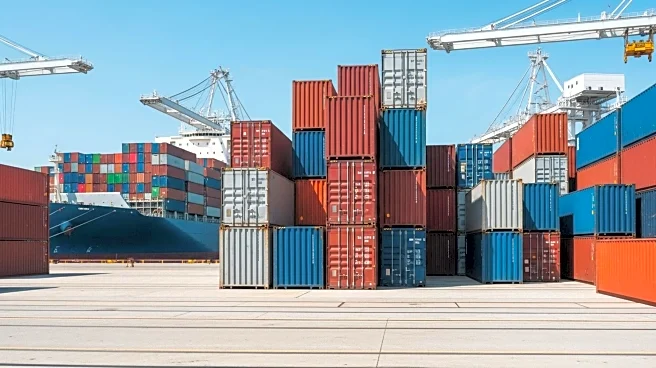What's Happening?
The U.S. government is set to implement port fees on Chinese-made freight vessels, causing confusion among ocean carriers. These fees, scheduled to begin next week, have led to concerns about potential financial impacts on ship financing terms. The fees apply to vessels owned or operated by Chinese entities and Chinese-built vessels, with charges based on cargo-carrying capacity. The fees are part of a broader trade policy by the U.S. Trade Representative, aimed at addressing China's dominance in shipbuilding. In response, China has introduced retaliatory port fees on U.S.-flagged ships entering Chinese ports. The situation has prompted shipping companies to reconsider their financing structures, with some opting for non-Chinese financing to avoid exposure to these fees.
Why It's Important?
The introduction of U.S. port fees on Chinese-built ships could significantly impact global shipping operations and trade relations. These fees may lead to increased operational costs for shipping companies, potentially affecting freight rates and global supply chains. The retaliatory measures by China could further strain U.S.-China trade relations, impacting businesses that rely on international shipping. The uncertainty surrounding these fees may drive shipping companies to seek alternative financing options, potentially shifting market dynamics in the ship finance sector. The situation underscores the complexities of international trade policies and their ripple effects on global commerce.
What's Next?
As the U.S. port fees take effect, shipping companies are likely to continue exploring non-Chinese financing options to mitigate potential financial impacts. The industry may see a shift in trade routes and vessel operations to avoid these fees. The U.S. Trade Representative has not provided guidance on potential amendments to clarify the fee structure, leaving companies to navigate the uncertainty. The retaliatory fees by China could escalate trade tensions, prompting further diplomatic negotiations. Stakeholders in the shipping industry will closely monitor these developments to assess their long-term implications on global trade.
Beyond the Headlines
The introduction of port fees highlights the geopolitical tensions between the U.S. and China, with broader implications for international trade policies. The situation raises questions about the sustainability of current trade practices and the need for clearer regulatory frameworks. The reliance on Chinese shipbuilding and financing underscores the interconnectedness of global economies and the challenges of navigating complex trade relationships. The fees may prompt a reevaluation of trade strategies and partnerships, influencing future policy decisions.









